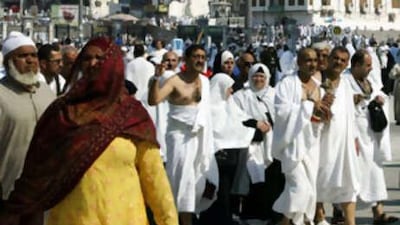JEDDAH // A sea of Muslim pilgrims has arrived in Saudi Arabia from all corners of the world to perform the annual haj in the holy city of Mecca - and still they come. For this year's haj, which begins tomorrow, numbers will rise as high as two million. The first stop for most is Jeddah, the port to which they travel by air, sea or land. The volume of human traffic is so heavy, Saudi officials are taking measures at each of Jeddah's entry points to ensure the mass of people does not become unmanageable. "We have to control the numbers of pilgrims, we have no choice," said Major Gen Mansour al Turki, the director of the Haj Affairs Department. "We are dealing with a limited capacity, where Mecca and the holy sites near it can't handle more than two million people." More than 230 pilgrim flights have been arriving each day at Jeddah's King Abdulaziz International Airport, which already has accepted about 1.5 million pilgrims. Its haj terminal is equipped to handle more than 3,700 people an hour and a health centre has been operating for several weeks. Today, however, the right of entry for pilgrims ends. "We have been extra strict at all entry points, and even at the borders of Mecca, to ensure a safe haj for the pilgrims, as well as to guarantee comfortable movement for the pilgrims as they perform the steps of haj," Gen al Turki said. The final number of pilgrims, including those arriving by land and sea or via Madina airport, will not be announced until the end of haj. Ships from Sudan and Egypt arrived packed with pilgrims who were quickly organised by haj agencies. Poorer pilgrims are housed free of charge at the white and blue haj complexes in the old Jeddah city. They stay as guests of the Saudi state, acting to ensure those of modest means are not deprived of the opportunity to perform their Islamic ritual. The impact on Jeddah is obvious as buses crammed with pilgrims clog traffic in an already overcrowded city. On the main road between Jeddah and Mecca, a 70km journey can take up to three hours. The pressure is felt despite Saudi Arabia's attempts to limit attendance. Last year the number of Muslims allowed into Saudi Arabia was reduced from two million to 1.7 million. Saudis themselves have suffered cutbacks, with only 250,000 allowed to take part, and then only with permits. "There have always been restrictions on pilgrims from within Saudi, but these have been hard to reinforce, particularly as those living in Mecca are difficult to monitor," Major Gen al Turki said. "This year, we decided to launch a major awareness campaign, asking Saudis and expatriates to get a permit." Posters and billboards across Saudi cities carry the warning "No haj without permit", with a large U-turn symbol to show the consequences of failure to obtain one. The symbol has a double meaning in Mecca. There, a big U-turn sign greets all approaching non-Muslims, telling them to turn back immediately or face severe punishment. Mecca is out of bounds for non-Muslims. Television and radio broadcast messages daily warning of heavy punishment if expatriates are found without haj permits. Penalties include possible deportation, according to Mecca's governor, Prince Khaled Al Faisal. And drivers giving lifts to pilgrims lacking permits face fines of Dh10,000 (US$2,720) per passenger. Although it is too late for Saudis to get permits, that has not necessarily stopped them. "I just put on regular clothes, say I am visiting family and then change into pilgrim's clothes inside the city at my friend's house or a hotel," said Ahmad, a Saudi who asked that his last name be withheld. According to reports, thousands of Saudis and expatriates perform haj each year without obtaining permits. The result is that many end up sleeping in public places around Mina, site of the 10th day stoning of three pillars, which symbolises the rejection of evil forces. This causes congestion and safety problems. Some Saudis feel "cheated" by a system that officially permits them to perform haj only once every five years. "It is not fair. We live here and yet we can't go do haj when we want," said Um Mohammed al Qurashi, a Saudi mother of four in Jeddah, who has to wait three more years for a permit. "Too many restrictions. When you do it the legal way, they can track down when you last did haj." rghazal@thenational.ae

Tide of faithful sweeps toward Islam's holy city
The sheer number of Muslims making the pilgrimage to Mecca puts the Saudi authorities under tremendous pressure each year as they try to provide transport and accommodation.
Most popular today
